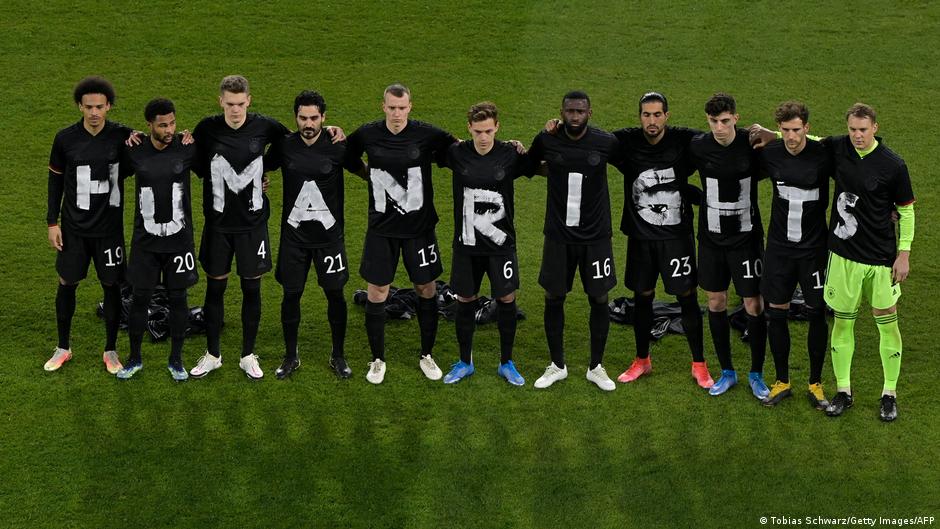
With the tournament less than two years away, players are now joining human rights campaigners, fans and sections of the media in questioning Qatar’s suitability to host 2022 World Cup, given the reported deaths of thousands of migrant workers on building sites and the country’s highly questionable human rights record.
After Erling Haaland’s Norway wore printed T-shirts reading “Human rights, on and off the pitch” on Wednesday, German players unveiled a similar but more makeshift effort ahead of their comfortable victory over Iceland the following day.
“We have the World Cup coming up and there will be discussions about it. We wanted to show we are not ignoring that,” Leon Goretzka, who scored the opener in a 3–0 win, told German broadcaster RTL.
“We wrote the letters ourselves. We have a large reach and we can use it to set an example for the values we want to stand for. That was clear,” he said.
Germany’s traditional footballing rivals the Netherlands also wore shirts bearing a similar message before their game against Latvia on Saturday.
Club vs. country
It’s not the first time Goretzka has expressed a social conscience, with his criticism of far-right German political party the AfD and his establishing of the “We Kick Corona” initiative together with teammate Joshua Kimmich earning him a reputation for decency.
Such a principled public image is less apparent for Goretzka and Kimmich’s club, Bayern Munich. The Bundesliga champions have been training in Qatar for a decade and Goretzka, Kimmich and the rest of the squad run out for matches with the logo of the state–owned airline on their sleeve.
Human Rights Watch, Amnesty International and other rights organizations have routinely condemned the working conditions for stadium laborers as “inhumane,” but despite criticism from Bayern fans CEO Karl–Heinz Rummenigge insists that working with Qatar is the right thing to do.
“Everybody who deals with the Gulf states will confirm to you that, in terms of developments regarding human rights and workers’ rights, Qatar has made steps in the right direction,” he said recently.
Bayern are not the only club with ties to Gulf states that are widely considered human rights abusers. Ilkay Gündogan, who plays for UAE–owned Manchester City, is another German international who is effectively being paid by the countries who they wish to stand against. Paris Saint-Germain, Chelsea and plenty of other top European clubs have links to regimes that many observers find unpalatable.
Norwegians demand boycott
Nevertheless, the recent public displays have drawn further attention to an issue that refuses to die down. British newspaper The Guardian reported last month that nearly 6,500 workers have died on stadium construction sites since the World Cup was awarded to the Gulf state in 2010.
FIFA president Gianni Infantino has always backed one of his pet projects, but his organization appear to have softened their longstanding aversion to anything they consider political.
“FIFA believes in the freedom of speech, and in the power of football as a force for good,” FIFA said in a statement after Norway’s win over Gibraltar. “No disciplinary proceedings in relation to this matter will be opened by FIFA.”
Organizers claim transparency
Many would suggest that FIFA are taking a similarly lax approach to the Qatari organizers. But the Supreme Committee for Delivery & Legacy (SC), who are responsible for the operation of the World Cup, dispute the claims made by the Guardian and human rights organizations.
“We have always been transparent about the health and safety of workers on projects directly related to the FIFA World Cup Qatar 2022,” a spokesperson said on Thursday. “Since construction began in 2014, there have been three work-related fatalities and 35 non-work-related deaths.
“The SC has investigated each case, learning lessons to avoid any repeat in the future. The SC has disclosed each incident through public statements and or Annual Workers’ Welfare Progress Reports.”
Whichever figures you believe, pressure on Qatar is mounting just as the build up to the tournament cranks in to gear.
On Friday, the Germany football association (DFB) said they were opposed to boycotting the Qatar World Cup despite supporting the players’ actions while Kimmich said “we’re 10 years too late to boycott” the tournament.
By Matt Pearson
IMAGE: German players made their views clear ahead of a qualifier for the 2022 World Cup earlier this week. Tobias Schwarz/Getty Images/AFP




